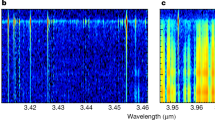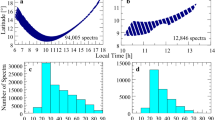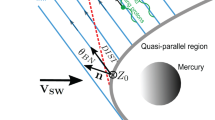Abstract
IN 1949, I reported1 finding a positive correlation between meson intensity at sea-level and the temperature of the air layer limited by the 200 and 100 mb. isobars. Lower layers appeared to have no appreciable contribution to this positive effect. Further measurements made lately by using a similar triple-coincidence arrangement with lead absorber have entirely confirmed these results.
This is a preview of subscription content, access via your institution
Access options
Subscribe to this journal
Receive 51 print issues and online access
$199.00 per year
only $3.90 per issue
Buy this article
- Purchase on Springer Link
- Instant access to full article PDF
Prices may be subject to local taxes which are calculated during checkout
Similar content being viewed by others
References
Duperier, A., Proc. Phys. Soc., A, 62, 684 (1949).
Chamberlain, O., Mozley, R. F., Steinberger, J., and Wiegand, C., Phys. Rev., 79, 394 (1950).
Camerini, U., Fowler, P. H., Lock, W. O., and Muirhead, H., Phil. Mag., 41, 413 (1950).
Heitler, W., and Jánossy, L., Cosmic Ray Conference, Como (1949).
Author information
Authors and Affiliations
Rights and permissions
About this article
Cite this article
DUPERIER, A. Temperature of the Upper Atmosphere and Meson Production. Nature 167, 312–313 (1951). https://doi.org/10.1038/167312a0
Issue Date:
DOI: https://doi.org/10.1038/167312a0
Comments
By submitting a comment you agree to abide by our Terms and Community Guidelines. If you find something abusive or that does not comply with our terms or guidelines please flag it as inappropriate.



